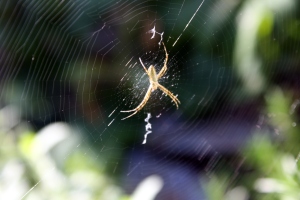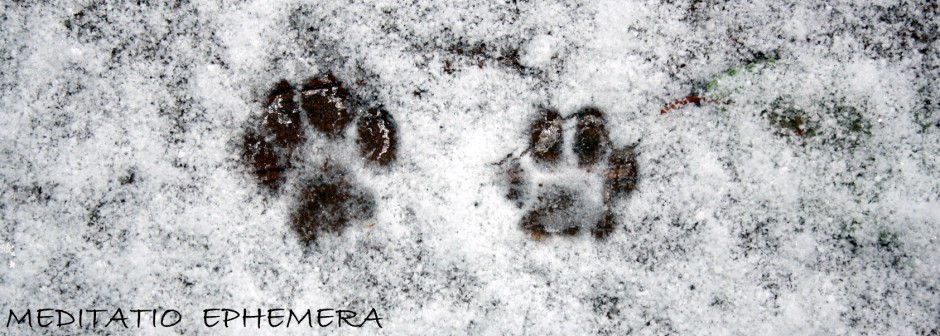 For the last few days I have been watching an orb-weaver in my perennial bed. The spider is small for her kind — no more than a half-inch long with legs extended — but her web is typically intricate and beautiful, concentric circles glimmering in the sun.
For the last few days I have been watching an orb-weaver in my perennial bed. The spider is small for her kind — no more than a half-inch long with legs extended — but her web is typically intricate and beautiful, concentric circles glimmering in the sun.
Summer is waning, and her time, too, is running out. I like seeing her there, living her life until she can’t, until the cold or the damp or some mysterious failing of her spider body — a seizing, a slowing — says it’s over. She won’t have a choice; she will die at the moment a natural death comes for her.
We humans aren’t always so lucky.
*****
My father sits in a wheelchair, head slumped, half-dozing in front of the television. He is in what is now known as a care center; they used to be called nursing homes. He has been here several weeks, incapacitated by shingles, pinched nerves and the beginnings of Parkinson’s disease. Sleep-deprived, sometimes confused, increasingly depressed. Scar tissue from earlier prostate surgery has made him unable to pee; he wears a catheter. He cannot reliably control his bowels; he wears a diaper.
My father, the high-school athlete whose biggest physical challenge was a lack of bulk. My father, the university professor who made a career of his intelligence, a progressive thinker who wanted to die with dignity, who filled out all the right papers.
He missed his moment, I think — the moment when death might have come for him naturally. Now he is given to Western medicine, which makes vast sums of money prolonging our lives. He has been prescribed a number of drugs, some of which may be causing rather than alleviating his symptoms. He has had expensive tests. Care center costs can top $300 a day.
His moment might have been two years ago, when he lost his balance and tumbled half into the little pond he had been trying to skim outside my parents’ home. It was a cold day, and he could not get back up and on to the rocky shore; when my mother found him, he was chilled to the core. Or, his moment might have been any of the times he has fallen since, debilitated by pain and fatigue and the frailty of an 82-year-old body.
Instead, there was well-intentioned help. There were visits to doctors, and then to specialists; there were scans and blood work, ambiguous diagnoses. There were medications. And now there is this: the care center.
Western medicine is about keeping people alive; the particulars of that life, its quality, are secondary concerns. Advance directives are useful only when extraordinary measures — artificial feeding, a ventilator — might otherwise be used to prolong life. Likewise, right-to-die laws apply only to carefully defined, imminently terminal conditions. They don’t address the long grey tunnel that often leads to that end, the attenuated arc of half-life during which the accepted standard of medical care thwarts, again and again, opportunities for natural death.
It’s not just the doctors, not just the pharmaceutical industry, not just the burgeoning business of care centers. It’s us, too. We don’t always recognize mercy. We are afraid to die; our loved ones are afraid to watch us die. We can enter that long grey tunnel without knowing it, and certainly without understanding the ramifications.
Still, if we are lucky — if we are not too drugged or demented or afraid — we can yet choose. Life, if life as it has now become remains acceptable. Or, death of the kind that might have come for us naturally. Death-with-dignity advocates call it VSED: voluntarily stopping eating and drinking.
Western medicine wants my father to live. His doctor advises an antidepressant, as if his depression is some mystery, rather than a natural reaction to unnatural circumstances.
My family, including my father, has a more pressing priority. We are aiming for a brain unaddled by needless or ineffectual medication, and by pain. We want him to have a clear mind, so that he may see the mouth of the tunnel for what it is. We want him to have again his moment, this time by choice: the life that is possible now, or the death that was possible then.
We change the drugs, seeking a better combination. We explore the remaining treatment options, anything that might give him some relief, some hope of significant recovery.
We wait.
****
I felt a change in the cool morning air as I awakened this morning, a shift in the seasons. One cat purred loudly on my chest; the other curled against my legs, still drowsy. I thought of my father, a thousand miles away; I wondered if, at that moment, he was slumped in his wheelchair. Or if today he might be more alert, even trying to use his walker. I wondered how he would live, how he would die. What he would choose. If he could choose.
I was warm and safe; I was healthy. I wanted this day; I wanted my life. And I hoped I would know when death comes for me, that I will somehow recognize the moment, feel the mercy. That I will go. That I will never enter that long grey tunnel. That you won’t, either.
I grind the coffee, hearing the beans give way, spilling that bittersweet smell into the air. I watch through the kitchen window as a crimson sunrise fractures the night. Then I wrap my fingers around the warm, steaming mug and make my way out to the perennial bed.
It had rained the previous day, damp and chill. I had wondered about her. But she was still there, suspended in her web. She had this day, too, this life. For now.
May you go in peace when your moment to die comes, I thought. Your first moment; your only moment. May you go in peace.




Your words remind me of songs we sing in our Threshold choir… Sending thoughts of light, clarity and peace. Thanks for sharing your thoughts so clearly and painfully honestly. Carolyn
LikeLike
We have a Threshold group here; it’s beautiful, meaningful work. Thank you for reading and responding.
LikeLike
Fellow readers articulate such beautiful thoughts in response to your moving piece about life, end of life and the issues there. I have no such beautiful words to say except it is so well written and makes me reflect on my life and that of those – who I love – around me. Please God may I have the opportunity to take the first moment that is presented to me.
LikeLike
Thank you for your kind response, my friend.
LikeLike
May you be happy. May you be healthy. May you be free of suffering…..Thank you for sharing such a personal and powerful essay with us.
LikeLike
You’re welcome. Thank you for the kindness of your blessing, which I return to you.
LikeLike
Deeply moving indeed…I share a similar experience with my dad who had to face so many losses… starting with his independence, his joy for reading (due to poor vision), his joy of conversation in the topics he was passionate about because he was put in front of the TV whether he wanted it or not (he totally hated sitting there with others who were sleeping in their chairs) That was the well intentioned “socialization” they provided at the center. They didn’t want him to get depressed being alone in his room…and that slow grey tunnel he had to pass through alone…I always wanted to write about it, but you have truly done a beautiful job reflecting on the issues of extending our lives without prioritizing the quality of life (even though that is the buzz word in “care centers”). Thank you!
LikeLike
What a lovely compliment, and all the more meaningful for the way you shared your father’s experience, and your own. Thank you for your kindness; hardship is always lessened by reminders that others are having the same experience.
LikeLike
Your such a talented writer! I enjoyed reading this post. It made me reflect on my own life, current season and the latter days that are coming. It made me think about western medicine and prescription drugs we take to help us survive our pain-but the end result is the numbing of our pain, causing us to miss the moment, miss our time and undoubtedly forget our years. Thank you for sharing. I look forward to reading the next one.
LikeLike
I’m honored to have you as a reader. Thank you for the gift of your time in reading and reflecting on this post, and for sharing your thoughts.
LikeLike
A poignant and thoughtful reflection Cate. I read Being Mortal by Atul Gawande and it supports much of what you are talking about … As well as giving guidance on end of life concerns and what we could be doing differently and with compassion. I highly recommend it. xo
LikeLike
Thanks, Val. Like you, I found Gawande’s book wise and relevant; so did my father, who read it this summer.
LikeLiked by 1 person
Wonderful 💕
LikeLiked by 1 person
This one, as many of yours do, hits close to home.
LikeLike
Not too close, I hope….
LikeLiked by 1 person
Almost a bull’s-eye, alas.
LikeLike
I’m sorry to hear it, Bob. My thoughts are with you.
LikeLiked by 1 person
It’s life, Cate. My Dad is nearing the end of his, but is still able to live at home. I only wish that he’d not been forced to suffer so many of the indignities that aging has forced on him.
LikeLiked by 1 person
” … the attenuated arc of half-life during which the accepted standard of medical care thwarts, again and again, opportunities for natural death …” I find this whole piece moving and exceptionally relevant. As I age, the walls close in around me. I see others further along this road than I am, and I wonder just where we are headed. A very moving piece. Thank you.
LikeLike
I’m so glad you found it worth the read; thank you for sharing your thoughts. I wish us all clarity and courage as we navigate our later lives; good luck would be helpful, too..
LikeLiked by 1 person